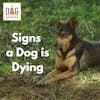Signs a Dog is Dying: A Vet Reveals What Your Dog May Be Experiencing | Dr. Demian Dressler Q&A

If your dog is lethargic, or vomiting, or seems to be visibly sick, you may see those as warning signs your dog is dying. But there are two more subtle signs you might miss. Dr. Dressler reveals the things he watches for.
Depending upon what is causing a dog to die, symptoms vary. But there are two things that Dr. Demian Dressler has observed that often show up when our dogs near the end of their life. Justin’s question sparks a deep conversation about the things that dogs may experience as they get ready to pass from this life.
Dr. Demian Dressler is the author of today’s sponsor, The Dog Cancer Survival Guide: Full Spectrum Treatments to Optimize Your Dog’s Life Quality and Longevity.
Links and Things Mentioned in Today’s Show:
The Dog Cancer Survival Guide: Full Spectrum Treatments to Optimize Your Dog’s Life Quality and Longevity by Dr. Demian Dressler and Dr. Susan Ettinger.
Related Links:
Here’s a great article to read that will help you to assess just how close your dog is to end of life: Is My Dog Dying? Here Are Some Warning Signs and Symptoms - Dog Cancer Blog
You can find hundreds of articles Dr. D wrote about dog cancer on his immensely popular website: https://www.dogcancerblog.com/meet-the-veterinarians-dr-dressler/
You can reach out to Dr. Demian Dressler directly on his veterinary hospital’s website: https://VetinKihei.com.
To join the private Facebook group for readers of Dr. Dressler’s book “The Dog Cancer Survival Guide,” go to https://www.facebook.com/groups/dogcancersupport/
About Today’s Guest, Dr. Demian Dressler:
Dr. Demian Dressler, DVM is internationally recognized as “the dog cancer vet” because of his innovations in the field of dog cancer management. A dynamic educator and speaker, Dr. Dressler is the author of the best-selling animal health book The Dog Cancer Survival Guide: Full Spectrum Treatments to Optimize Your Dog’s Life Quality and Longevity.
Dr. Dressler is the owner of the accredited practice South Shore Veterinary Care, a full-service veterinary hospital in Maui, Hawaii, Dr. Dressler studied Animal Physiology and received a Bachelor of Science degree from the University of California at Davis before earning his Doctorate in Veterinary Medicine from Cornell University.
"Your dog does NOT have an expiration date, and there are things ALL cancers have in common that you can help fight. Imagine looking back at this time five years from now and not having a single regret." - Dr. D
You can find hundreds of articles Dr. D wrote about dog cancer on his immensely popular website: https://www.dogcancerblog.com/meet-the-veterinarians-dr-dressler/
Dog Cancer Answers is a Maui Media production in association with Dog Podcast Network
This episode is sponsored by the best-selling animal health book The Dog Cancer Survival Guide: Full Spectrum Treatments to Optimize Your Dog’s Life Quality and Longevity by Dr. Demian Dressler and Dr. Susan Ettinger. Available everywhere fine books are sold.
Listen to this podcast episode for a special discount code.
If you would like to ask a dog cancer related question for one of our expert veterinarians to answer on a future Q&A episode, call our Listener Line at 808-868-3200.
Have a guest you think would be great for our show? Contact our producers at DogCancerAnswers.com
Have an inspiring True Tail about your own dog’s cancer journey you think would help other dog lovers? Share your true tail with our producers.
Dog Cancer News is a free weekly newsletter that contains useful information designed to help your dog with cancer. To sign up, please visit: www.dogcancernews.com
>> James Jacobson: Okay, well, let me ask you this question, which will be more based on your experience and your feelings. Cause I think of you, sort of as a Dr. Doolittle, Demian: do dogs know when they're dying?
>> Dr. Dressler: Yeah, I think so. I believe so.
>> Announcer: Welcome to Dog Cancer Answers, where we help you help your dog with cancer. Here's your host, James Jacobson.
>> James Jacobson: Hello friend. And thank you for joining us today for a very special Question and Answer episode with Dr. Demian Dressler. We get a little deep kind of quick with Dr. D, which honestly happens more often than one would assume. Today's question comes from a listener whose name is Justin, who wrote in to ask the following: what to dogs do when they're about to die?
What are some of the signs that they are in fact, getting ready to leave us? And Dr. Dressler surprised me with two very different answers than I expected. Let's listen in.
Dr. Dressler, thanks for joining us today. We're going to go back to the mailbag and here is a question that was sent in from Justin.
I thought it'd be really helpful for our listeners. The question is pretty simple, but it may have some interesting meanings for you: what do dogs do when they're about to die?
>> Dr. Dressler: It's a tricky question because there's all sorts of different ways to die. And if we have to look at cancer, there's all kinds of different ways to die with cancer as well.
So that's a very tough one, but what I will say is the following: you want to look at, first of all, general signs of illness and the illness is going to be the thing, usually, that precedes the dying part. It's really unusual for an animal or a human animal to have zero signs of illness and then die.
That's the minority of the time. It does happen. You can have sudden cardiac events, you can have strokes, you can have infarcts, you know, things like that do happen. But again, that's the exception and not the rule. So first of all, we have to say, okay, well, what are some common signs of illness that my dog is sick, whether it's cancer or some other type of syndrome.
And so we're looking for coughing or sneezing or vomiting or diarrhea or increases in thirst and increases in urination and a loss of appetite and a loss of energy level and a loss of a desire to do its normal things. So that's your short list on signs of illness. There can also be physical discomfort perhaps as a piece of that, which is again, an whole other subject.
So then we say, well, how do I know when my dog is going to die based on the signs, that's very difficult to say. And the reason why is because nobody has a crystal ball, we don't have a date stamp and neither does our dog. And what's interesting is some of these old dogs, particularly the ones that tend to sort of cling to life, and I think guardians, you know who I'm talking about, if your dog is one of those dogs, because they tend to get a little bit irritable.
>> James Jacobson: They get old and irritable
>> Dr. Dressler: Yeah, they get old and they get crotchety, but it's a fighting thing. It's a manifestation of being a fighter, as opposed to sort of these old dogs who kind of roll over and give up the ghost.
I find that dogs that are very passive in life tend to be passive, clinging to life. Also. They tend to exit more quickly. Where the dogs that are more tenacious and stubborn, kind of like people, they seem to just go on and on. And, and if you look at the end stage of these dogs, they'll go through these cycles where they will get sick, apparently sick, and everybody will think, well, that's it for Fluffy. And Fluffy, all of a sudden will claw back and start acting normal again. And then a couple of weeks later, Fluffy's not doing well again. And it's not that the disease itself is changing. I think it's just that the response that disease tends to be cyclic.
So there's that pattern I see a lot. Then if you get to kind of the tail end and you're getting into dying of natural causes versus, uh, humane euthanasia decision, which is a whole separate subject. That's a separate show, as I said. Yeah. One of the most common things I see will that they will get disengaged with people they'll sort of go inwards and a lot of times they'll want to go outside.
They have an instinct and I'm not sure what the point is, but they'll often go outside and go hide or find a separate place to die that's different from their den or their home or something. It's something about being in the air and being in the elements, I think, is connected with this final phase of departure.
So those are two things, I think that I've seen more or less consistently, I don't know about every time, but one is they'll sort of turn inwards in terms of their focus. They'll kind of not really be as present at all. And you'll see them sort of staring off into space and kind of like they're getting ready for the big Exodus to wherever dogs go.
And then they'll also tend to gravitate towards the elements, the natural elements. So. Air and sun and maybe snow, things like that.
>> James Jacobson: Besides those two, any other signs that you've noticed that tend to happen? Obviously, every dog, every experience is different.
>> Dr. Dressler: The problem is, is that it's a simple question with a complicated answer that has many, many different answers, and those are the two commonalities that I can think of because then you have to get into the specifics of what exactly is wrong with them because a dog with a bleeding tumor in his spleen is going to die in an entirely different way than a dog with a brain tumor. They're totally different in terms of how they look and what the disease entity does to the animal. So it's a little bit hard to make a general statement.
And so the question is predicated on the idea that death is a consistent process when it actually, the number of differences in the dying process, far out number, the number of similarities.
>> James Jacobson: Okay. Well, let me ask you this question, which will be more based on your experience and your feelings. Cause I think of your sort of as a Dr. Doolittle, Demian: do dogs know when they're dying?
>> Dr. Dressler: Yeah, I think so. I believe so. I don't know if you can say that across the board a hundred times, it's kind of like, do people know when they're dying? It's the same thing. It's again, the fact that we call them dogs, you use a single word for them, sort of misses the point. These are individuals, just like people are individuals they're different.
So they're going to know different things and they have different awarenesses and they have different experiences in the same exact way that people do. But yeah, I think that most of the time the dogs seem to have an awareness that they're going to be exiting because they're sentient beings. I mean, they know when they're hungry, so why wouldn't they know when they're dying, you know?
>> James Jacobson: Okay. And then in The Dog Cancer Survival Guide, you talk about like in the wild, they would just kind of go off on their own and hide. And I'm assuming that that natural tendency of wolves for example, is something that you're seeing when dogs want to go off and spend more time outside.
>> Dr. Dressler: Yeah. I mean, it could be, there's a couple of different reasons so that I can hypothesize as to the why's there.
And I don't want to get too sort of spiritualist in that, but I could. But if you just look at it very basically: having a corpse in your living room is unsanitary. So that's the first thing. It's probably better. If you're going to become a rotting body, to rot elsewhere. Furthermore, there's carrion eaters and there's other predator species that might actually be happy, either eating you or eating your fresh remains.
And it's not good to bring those predator species close to your babies and close to your family and your pack. So we'd suspect that's the main reason why that instinct is there. I think. The other thing too, you know, again, dogs are sentient beings. They can feel, you know, there are, there's sensations that I think feel good and there's sensations that I think feel bad.
And I think being in an open space is a good place to be, particularly when you're starting to depart. When I say an open space, that doesn't mean that they don't find little enclosures. That's not what I'm getting at, but like fresh air and being connected with the elements in that way. I think they sort of go back, maybe there's like a Rolodex, not only of their life, but also the species existence where they may be. It's a very primal thing, dying. You know, the entries and the exits here are very basic processes. And I kind of think that because there's a very, very old processes like being born and dying are very, very, very old, I kind of think that maybe they revert to an older way and maybe they're more comfortable being in an outside environment as a consequence of that, instead of being in front of your iPad.
>> James Jacobson: I have a theory, it's, you know, it's one of these profound things and it's impossible to validate, but I sense that dogs find their sense of spirituality by feeling connected to the sky, by being able to look up at the natural sky and just be outdoors.
>> Dr. Dressler: Yeah. There's something about the openness. Yep. I agree.
>> James Jacobson: Yep. Okay. Well, thank you very much for that insight. I appreciate it. Thank you, Dr. Dresser.
>> Dr. Dressler: You're welcome.
>> James Jacobson: So, if you are grieving or think that you might have to grieve your dog soon, I want to personally invite you to join Dog Cancer Support, which is our private Facebook group.
You can find it at the website, DogCancerSupport.com. It redirects to our Facebook group. We'll also have a link to that support group in the show notes for today's episode at dogcanceranswers.com. I want to thank Dr. Dressler and also Justin for today's important question. Now, if you have a question that you would like one of our veterinarians to answer on a future episode of Dog Cancer Answers, we would love to hear it.
I'm going to tell you how to do that right after this short break.
Those magic touchstones remind me to tell you as promised how to get a question to us for these Question and Answer shows. You can simply call our Listener Line. This is a podcast, so it's always great to hear your voice. You can call this number. It's (808) 868-3200 and leave recording our voicemail and we will answer it on a future, show. That number again: (808) 868-3200. Now you can also reach out to us on our website at dogcanceranswers.com and send us a message there, just like Justin did. There's also a way that you can find all of our episodes in our back catalog, which cover a wide range of topics at the website, dogcanceranswers.com.
You'll find those episodes plus links to our YouTube channel, which has a lot more content. And easy links to the podcast so that you can follow us on Spotify or subscribe to us in Apple podcasts or Google or your favorite podcatcher. Now, why do I urge you to subscribe? Well, first of all, subscribing is free, but more importantly, when you subscribe, our latest episodes will always show up in your feed.
Not every show will be directly relevant to you, but some of the shows will be, and, if you subscribe, they'll be there and you'll know where it is. And finally, please subscribe and set your app to download our episodes because that way, the podcast algorithm in the sky will notice that you think this show is valuable and help more dog lovers find us when they may need the information about canine cancer the most.
So subscribe, download, tell friends who have dogs about the show because, unfortunately, cancer is the Number One Killer of Dogs. So the odds are good that maybe one of them will need to know about Dog Cancer Answers someday. And you can be the one who tells them. So tell your veterinarian also, because you know, if veterinarians know they can share that with their staff. We are here for you and for people all over the world.
And the best way for dog lovers to find out about this show is through word of mouth. By telling another dog lover you're helping us. Not just them and their dog, but their friends and dogs and so on. And, and so on it, it's just good karma. Please let people know about Dog Cancer Answers. It's a niche program, but if you're going through it, as you know, it's tough and you need all the help and support you can get.
And that's what Dog Cancer Answers is all about. I personally am driven by a mission to raise the quality of life for dogs and the people who love them, as are all the folks who work with us at Dog Podcast Network. So please subscribe and tell people about the show. Anyway, that is our program for today. On behalf of everyone here at Dog Podcast Network, I want to wish you and your dog a very warm Aloha.
>> Announcer: Thank you for listening to Dog Cancer Answers. If you'd like to connect, please visit our website at dogcanceranswers.com or call our Listener Line at (808) 868-3200. And here's a friendly reminder that you probably already know: this podcast is provided for informational and educational purposes only. It's not meant to take the place of the advice you receive from your dog's veterinarian. Only veterinarians who examine your dog can give you veterinary advice or diagnose your dog's medical condition. Your reliance on the information you hear on this podcast is solely at your own risk. If your dog has a specific health problem, contact your veterinarian.
Also, please keep in mind that veterinary information can change rapidly. Therefore, some information may be out of date. Dog Cancer Answers is a presentation of Maui Media in association with Dog Podcast Network.
New to Dog Cancer Answers?
Here are some great episodes to start with. Or, check out episodes by topic.









